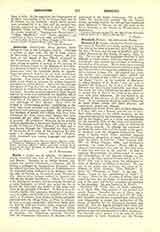

Benda, a titular see of Albania. Its history is closely connected with that of the Sees of Narenta and Mostar. Narenta, or in Italian Narona, represents the ancient Chelmium, or Chulmia, and its bishop, a suffragan of Dyrrhachium (Durazzo), took the title of episcopus Stephanensis, or Stephaniacensis, the cathedral being dedicated to St. Stephen; this is the title of Cosmas at the council under Photius in 879. But as these bishops resided at Spalato, the title shortly became Spalatensis. About the middle of the fourteenth century, Narenta became the seat of a Latin bishopric, to which was united the See of Benda, the chief town in a district of this name, near Croia, in the pashalik of Scutari. Its bishop thus obtained a double title, episcopus Bendensis et Stephanensis, to which, about 1400, was added the title Priscensis, or Prisnensis, from Prisca, or Prisna, probably identical with the village Presa, or Press, in Albania. Be that as it may, these three titles were borne from the first by only one titular; Gams separates them wrongly (Series episcop. 422). The first titular was not, as is commonly said, the Dominican Petrus de Anagnia, but Demetrius, probably identical with the Franciscan Demetrius de Scutaro who is mentioned in the Bullar. Franciscan. (VI, n. 662). From the seventeenth century the see became titular, probably because the bishops had transferred their residence to Mostar, on the left bank of the River Narenta, a see known as Mandatriensis et Dumnensis.
L. PETIT

